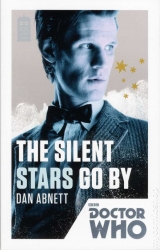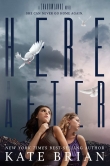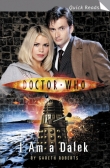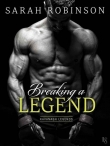
Текст книги "Doctor Who- The Silent Stars Go By"
Автор книги: Dan Abnett
Жанры:
Классическое фэнтези
,сообщить о нарушении
Текущая страница: 4 (всего у книги 14 страниц)
‘What sort of influence?’ asked Amy.
‘Let’s not worry about it until I’m sure,’ said the Doctor. He began to stride along the snowy path between the trees with great purpose. ‘Let’s hope it’s a glitch. A processing glitch that I can fix.’
‘A glitch?’ asked Amy, narrowing her eyes to look at him.
‘Not even a glitch.’
‘No?’
‘Less than a glitch. Smaller than a glitch.’
‘Glitch– ish?’ she asked
‘Exactly!’ declared the Doctor. He looked back at Bel. ‘Which way from here?’ he called brightly.
Rory doubted he could run much further. His legs and lungs were hurting from the effort, and his heart was pounding. He could barely draw a deep enough breath.
There was cold sweat on his spine under his clothes.
This was certainly not the way he’d have chosen to spend Christmas.
He smelled something suddenly. It wasn’t a strong smell at all, but against the clear, pure atmosphere of the woodland it stood out sharply. It was a warm smell, wet and metallic, like the linty steam of a laundrette, or the outflow of the industrial washing machines at the back of Leadworth hospital. What was that? What could possibly be warm and wet in a place so locked in by ice and snow?
He came through a stand of trees to a lip of rock. A bank fell away below him, thick with slithered snow.
Below him was a river. It was quite broad, falling steeply down the rocky throat of a gorge to his right into the steep cut basin below him. The far side, steeper than the one he stood on, was densely packed with trees.
The river, once it had cleared the jumbled, snowcovered undergrowth of the gorge, was ten or twelve metres across. It had frozen over with a thick crust of ice that had been overlaid with the previous night’s snow. It looked like a broad stretch of pale concrete. The gorge clearly trapped cold air over the open stretch of water.
Rory glanced over his shoulder. The green thing was still in pursuit, trudging through the trees, occasionally raising a clamp-hand to snap branches out of its way. It was thirty metres behind him and closing.
Rory had speed on his side, but not stamina. The thing just kept going. Rory knew he’d have to rest soon. He was exhausted, as if he’d run a marathon only to find there was no one waiting for him with a tinfoil blanket and a bottle of orange squash.
He made a snap decision. The density of trees on the far side of the river looked as though it offered the best chance of hiding he’d seen all day. The river was an added plus too. The green thing was big and evidently heavy. Rory doubted the ice, even though it looked like bullet-proof plate glass, would support a weight like that.
He hurtled down the bank, almost falling and rolling. He kept his footing, skidding down the snow like a downhill skier. He picked his way through the snowy rocks and boulders by the river’s edge, sliding on small, trapped puddles of ice, and reached the river.
Rory knelt down, reached out, and tested the ice with his hand. He applied firm pressure. It felt rock solid. As a nurse, he’d seen plenty of people brought into casualty with hypothermia and worse after falling through ice into ponds and lakes. Going out on ice was a stupid, stupid risk to take. Then again, none of the accident victims he’d seen being wheeled in on stretchers had taken to the ice because they were being chased by a two-metre tall, bipedal crocodile with baleful red eyes and a ray gun.
On cue, the green thing appeared at the top of the slope behind him. The afternoon sunlight flared off its pie-segment red lenses as it turned its ridged head to look at him.
Rory got up. He put a foot out onto the ice, let it take his weight, and then gingerly stepped clear of the bank. It was slippery, despite the dusting of snow. It felt like a window lubricated with washing up liquid under his feet. He took one step, and then another, arms wide for balance, teetering. The ice beneath him creaked. It made the sorts of popping, squealing protests that polystyrene packing made when you got a new TV or microwave out of its box.
He wobbled. He took another step. Another.
Another.
He glanced back. The green thing was coming down the slope after him, surefootedly negotiating the deep snow. It had a clear view of him. It could shoot him now. He was an open target.
He took another step. He took another. He was almost halfway across.
The ice gave out under him.
He plunged straight down into the river as though a trapdoor had slammed open underneath him. The moment he went, he knew he was done for. Even if the shock of the freezing water didn’t actually kill him stone dead, he was miles from help and medical attention. His body temperature would drop sharply, and never recover. He would seize up and die.
He went under, right under the water. He was braced for the terrible cold. It was so cold, it seemed to burn him. Then he realised it wasn’t cold at all.
The water under the crust of ice, fast-flowing and brisk, was warm. The water was warm.
Rory floundered, baffled. He struggled for the surface. Above him, he saw daylight. The ice had given way in several places, its disintegration prompted by the hole he had caused. The warm water was eating away at the edges of the plunge-hole, like a corrosive agent at work, broadening it and creating a channel.
He struck up towards it, arms churning, weighed down by his waterlogged parka. He broke the surface and took in a lungful of air. The cold stung his face.
The warmth of the water was almost like a blessed relief from the gnawing ache of winter.
Spluttering, he started to tread water, the motion of the water rotated him in the ragged space he’d made in the ice cover.
He saw his monstrous pursuer. It had reached the bank and was staring out at him. He was right there in front of it, but it didn’t seem to register him properly.
Heat, he thought. Heat. It was following my heat.
Now I’m in hot water, I’m harder to detect. It can still see me, but my thermal image is more difficult to isolate.
Rory took a deep breath and went under. He didn’t want to be visible at all. He wanted the water to mask him entirely.
‘In hot water’ indeed.
He wanted the river to carry him along and hide his trail from the creature.
For a moment, almost jubilant, he considered his luck. Falling through the ice had seemed to represent certain death, until he discovered the water beneath was warm. Being cornered in the water seemed to represent a second certain death, until it became apparent that the surrounding heat was confusing his implacable pursuer.
Then Rory realised there was a downside after all.
He swam underwater, borne along by the current, intending to surface for another lungful of air further downstream.
But he was under the ice again. He struck it from below, expecting it to splinter and give, but it was solid. It was as hard and firm as an oak lid on the top of the river. There was no air. There was no gap. There was no space for him to grab a breath.
He wasn’t going to die of hypothermia or temperature shock. He wasn’t going to be broken or blasted by a giant green monster.
He was simply going to drown.
Chapter
6
Deep and Crisp and Even
In the time it had taken them to trek through the shadowed snow of Would Be, the sky had changed colour. Looking up through the trees, Amy saw an expanse overhead that looked like wet slate. There was a whisper of cloud. A moody twilight had fallen across the wood.
Snowlight. She remembered it from her childhood.
A magical dusk where the ground seemed brighter than the sky, foretelling the imminent arrival of snow. It was an oddly fond memory, but in her current situation, it was not an exciting prospect.
A minute or so later, the first flakes started to fall.
They came down lazy and slow, just one or two at first, drifting like ash from an evening bonfire, or drowsy bumblebees.
‘Button up!’ declared the Doctor. ‘Not far now.’
The snow grew a little heavier, but it was still pretty, like the picturesque flakes on a Dickensian Christmas card scene, rather than a full-on Scott of the Antarctic /
March of the Penguins / ‘I’m just going outside now, I may be some time’ thing.
Adjusting her mittens, Amy noticed how both Arabel and Samewell were intrigued by the falling snow. Neither of them had ever seen much of it, certainly not in its most fleeting, eerie state of actually falling out of the sky.
‘It’s a real novelty,’ said the Doctor, noticing her interest. He had plucked up the collar of his jacket and was holding it closed with one hand.
‘Like a Christmas single?’ she asked, smiling.
‘It doesn’t mean it’s a good thing,’ he replied.
‘So, just like a Christmas record, then?’ she asked.
She watched Bel take off her glove and hold out a hand, letting flakes alight on her pink palm. Samewell grinned, and stuck out his tongue to catch a flake.
‘What are you thinking about?’ Amy asked the Doctor.
‘I’m thinking about the little pockets of early human beings,’ he replied quietly. ‘Little communities of brave and determined hunter-gatherers, delighted by the unfamiliarity of snow and not even beginning to realise it’s the first traces of an approaching ice age. Not even beginning to realise that what is enchanting now will starve them and freeze them and kill them inside six months.’
He blew on his hands.
‘Let’s find this memory yard,’ he said.
It wasn’t far off. With the ghost snow falling as silently as moving stars, the clearing was hauntingly beautiful. It was also terribly melancholy. The Doctor reckoned that Would Be had been deliberately planted by earlier generations of Morphans. The little grey headstones looked like trees that had yet to flourish.
Amy couldn’t believe how many of them there were.
They were like the rings of a tree. Add them all together, and they represented the toil and dedication that had gone into building Beside.
Bel took them to the marker of her father’s grave.
Though the snow was laying, it had not yet covered and hidden the jar and the little bunch of heathouse flowers.
‘She was here,’ said Bel. ‘Only Vesta would do that.’
‘You wouldn’t do it?’ asked the Doctor.
Bel seemed to think about replying, but didn’t. She looked as though the answer was too sad or ordinary or unremarkable for her to say out loud.
‘Bel would mean to,’ said Samewell, ‘but she’s always so busy. We’re all so busy. Vesta would remember what day it was.’
The Doctor walked around the grave two or three times, a thumb under his chin and an index finger crooked across his mouth.
‘There are only her tracks,’ he said, pointing. ‘Only hers. The snow’s beginning to hide them. Look, that’s her. Footsteps and the brush of long skirts. Just hers.
Well, ours too now, but ignore them. She came up the way we came, up the path. She came up from the plantation. But she didn’t go that way. She went off in the other direction.’ He turned to Bel. ‘Where else would she go?’
Bel shrugged. ‘Nowhere. She’d have been late for work as it was. Guide’s Bell would have rung. She would have just gone back.’
‘What’s this way?’ the Doctor asked, following the line of swiftly vanishing footprints.
‘Nothing,’ said Samewell. ‘If you go that way you’d eventually reach Farafield, I suppose. Firmer Number Three is roughly that way.’
‘Only roughly,’ said Bel.
They all squinted into the falling snow. The sky had darkened so much, it was hard to make out the gloomy shoulders of the mountains.
‘She was going somewhere,’ said the Doctor, leading the way briskly. The trail took them out of the memory yard and deep into the trees. He pointed at the ground as he walked.
‘Look,’ he called back. ‘Straight line! She wasn’t wandering, wasn’t strolling around. A very deliberate straight line.’
‘Maybe she saw something,’ suggested Amy, close on his heels.
‘Saw what?’ asked Bel, following along with Samewell.
The Doctor stopped suddenly. ‘That’s also a very deliberate straight line,’ he said. There was another line of prints in the snow, crossing Vesta’s path like a ‘T’. It was also fading in the snowfall, but not quite as fast because of the sheer size of it.
‘What made those?’ asked Amy, slowly and very cautiously.
‘I don’t know,’ said the Doctor, hunkering down to examine them. He measured one out against the side of his hand.
‘They’re giant,’ said Samewell. There was a catch of anxiety in his voice.
‘Yes,’ said the Doctor, ‘they are.’ He got up. ‘They were here first,’ he said. ‘She came upon the trail.
Found it.’
‘What are you, the last of the Mohicans or something?’ asked Amy.
The Doctor looked at her.
‘Baden-Powell taught me the rudiments of tracking,’
he replied.
‘Of course he did,’ she replied.
‘Chingachook merely refined some of my techniques,’ said the Doctor.
‘Chingachook’s a fictional character,’ Amy replied.
‘Is he?’ asked the Doctor.
‘Yes, he is,’ said Amy.
‘Or was that just the deal Fenimore Cooper struck to get permission to write the story?’
‘What are you talking about?’ asked Bel.
‘The real question,’ Amy replied, still looking at the Doctor, ‘is why are we talking about it, because it’s a stupid conversation.’
‘You started it,’ said the Doctor. He turned back to the tracks. ‘Look, she came up here, came across the tracks.’
‘The giant tracks,’ said Amy.
‘The giant tracks, yes, and then she headed off back into the woods. In a hurry.’
‘Scared?’ asked Bel.
‘Maybe scared. She didn’t retrace her steps, just went off in a hurry. Come on,’ he added, and started to follow the new trail in a hurry.
‘Slow down, Davy Crockett!’ Amy cried, following.
‘Davy Crockett was a terrible tracker!’ The Doctor called over his shoulder. ‘Lovely man. Nice hat. Very overrated in the tracking department.’
He came to a halt again. They’d reached a small clearing close to the northern end of the memory yard.
‘What is it?’ asked Amy.
‘Oh dear,’ said the Doctor.
‘What is it?’ Amy repeated.
‘Something bad happened here,’ said the Doctor quietly.
Samewell and Bel came up behind them.
‘Is that..?’ asked Samewell.
‘That’s blood,’ said Bel.
The snow was falling heavily, but it hadn’t quite managed to obliterate the dark stains soaked into the ground cover.
‘Yes, it is,’ said the Doctor. ‘And I’m rather afraid there’s an awful lot of it.’
Ten seconds before he drowned, Rory managed to right himself in the fast-flowing undercurrent, just long enough to hammer his fists against the roof of ice. It was like banging against the glass of a display aquarium. The noise was as muffled as the thud of his heart. Nothing yielded.
The light was strange under the filter of the ice.
There was a sickly blue-green cast. The water, so curiously warm, swirling him along in a turbulent spiral of froth and twinkling air bubbles. He bounced.
He up-ended. He glanced off the ice sheet, hurting his head.
Five seconds before he drowned, he failed to hit the ice with a last, frantic punch.
Three seconds before he drowned, the water flow accelerated and smashed him through some kind of submerged gate or shutter.
One second before he drowned, he stopped drowning and breathed again.
There was no ice.
He’d surfaced, with access to the wintery air. He gulped it in, as though he was drinking it, filling his burning, about-to-burst lungs. He went under again, remembered to tread water, and came up spluttering.
Blinking water out of his eyes, he tried to get his bearings. He was in a pool, like a large mill pond.
Traces of slushy ice drifted on the surface, but it was generally unfrozen.
The river had brought him downhill under its frozen crust and thrown him through a sluice gate into the pond. He still couldn’t fathom why the water, deep under its cooler surface layers, was warm. It had to be some kind of artificially heated flow, surely?
Whatever the answer, it wasn’t his immediate concern. The unnatural warmth of the water had spared him from a numbing death, but he was still soaking wet outdoors on a snowy day. He had to get out, get dry, find shelter.
The pool, shadowed by mature trees, was flanked by buildings. They looked like they were made of wood and stone, with plates of grey metal. The drab side-walls were patched with green moss and lichen as though they had stood for years, and some of the metal pins and bolts had corroded green. The buildings overhung the pool, and parts of them extended out into the water like dams or the gates of a filtration plant.
Rory let the gentle current of the pool, its power slackened by the sluice, carry him towards the projections. He caught hold of some metal pipework.
The cold of it hurt his palms. He went down the frame, hand over hand, dragging himself through the water until he was close to a small metal jetty, then he heaved himself up out of the water. It felt like he weighed a ton.
Water streamed off him, pouring out of his saturated clothes as he stood up. Steam plumed off him. He could feel the cold biting into his skin, turning his clothes into heavy, clammy bandages.
He slopped down the jetty. The buildings were definitely water mills of some kind. The river had been directed via the sluices into the catchment pool so that it could drive turbine systems hidden in the utilitarian structures. The buildings seemed old, but the technology appeared modem. Rory had already got used to dismissing that kind of anachronism.
The sky had changed colour, as if it had soured like milk, and heavy snowflakes were starting to fall. Rory knew he had to get inside one of the buildings before he lost too much of his core body heat.
There were no immediate signs of a door.
He walked along the jetty, and then along a timber-planked service walkway between two of the structures. There was no snow here, as though internal heat had kept it from laying. If he could only get inside…
It suddenly occurred to him to look around and check for signs of pursuit. He had no idea how far the river had carried him, but even the slightest chance that the green thing was still after him made his heart skip.
He looked back up the pond towards the sluice, and towards the trees on the far bank. He saw nothing but green shadows and the snow, which was now falling quite fast.
Green shadows seemed perfect for a green thing to hide in, no matter how big it was.
He followed the walkway round. There had to be a hatch or an entrance somewhere.
He stopped. He heard something. He couldn’t tell what it was. The crunch of a footstep? The creak of ice? The crack of a branch snapping under the snow’s weight?
It was close. Had that thing located him again already? How had it caught up so fast? He crept a little further, encumbered by his soaked clothing. There was a hatch. Down the end of the walkway, there was definitely a hatch.
He took a look over his shoulder.
Just for a second, he saw the light reflect off red eyes. Just a glint, like the gleam of blood. Red eyes, out there in the enclosing darkness of the wood.
Red eyes searching for him.
He hurried towards the hatch. Looking back, he saw that the eyes had gone. He heard a noise. A footstep on a metal walkboard.
Something was on the jetty. Something was moving.
Rory reached the hatch. There was a recessed slot built to fit a human hand. He reached in and turned the rotator bar. The hatch unlocked. He pulled it open and went inside, not even caring what might lie within.
Warmth hit him, and darkness surrounded him. He heard another footstep on the jetty, closer. He dragged the hatch shut and locked it behind him.
He looked around. He was in some kind of machine space above one of the turbines. He could hear the rush of water and the cycle of a wheel or a screw system coming up from below. It was very dark, but it was a lot warmer inside than outside.
He crouched down inside the hatch. He could hear whatever it was moving outside. He could hear it walking along the jetty and then the timber planks. He put his hand on the door bolt to stop it being turned from outside. Something came close to the hatch, went past, and then came back. He held his breath as it began to scrape and scratch at the recessed handle. He could hear a deep, rasping breath, a ragged, asthmatic wheeze.
It was trying to get in. It was trying to get in and get at him. It knew he was there.
The scraping and rattling grew worse, as if the thing outside possessed hands that were too big to fit the slot. It banged the hatch instead. The breathing became more laboured, a wet hiss from gurgling lungs.
The effort suddenly stopped. Rory waited, clasping the inside handle. He heard a noise, almost a voice, followed by movement.
Then the hideous discharge of the green thing’s weapon, a repeated burst, squealed right outside. It made him jump. It hurt his ears. There was an impact.
Something fell, or collided with something else heavy.
The weapon went off again.
Silence.
Rory waited for a long time, scarcely daring to move or breathe. He waited for some sign or clue from outside, but heard no further sounds.
When he had waited, unmoving, for what seemed like long enough, and then a bit longer just to be safe, he got up quietly and began to grope through the darkness to see if he could find a more secure hiding place further inside the structure.
He realised he wasn’t alone in the building. He came to this realisation immediately after he managed to say the words ‘Hang on’, and immediately before something heavy smacked him across the side of the head and knocked him out.








